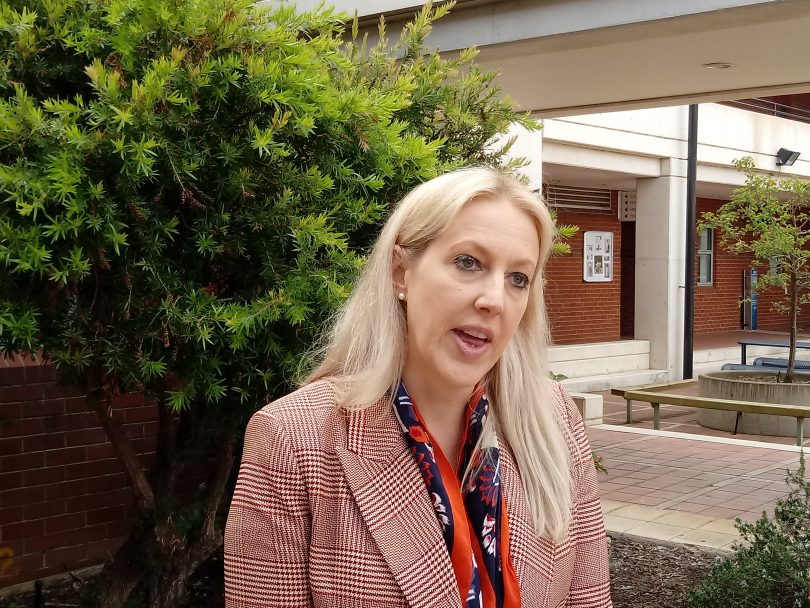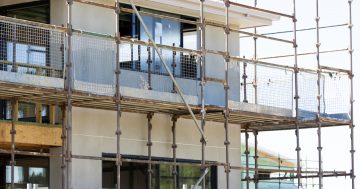
Canberra Business Chamber CEO Graham Catt: “We need a focus on initiatives that support and foster the local businesses that provide more than 60 per cent of Canberra’s jobs.” Photo: Supplied.
According to the Canberra Business Chamber, Canberra businesses impacted by the COVID-19 economic downturn were still in need of support from the ACT Government.
Canberra Business Chamber CEO Graham Catt said the Budget could have done more for businesses hit hard by COVID-19 to help them recover.
”Now we’re in a recovery phase we need a focus on initiatives that support and foster the local businesses that provide more than 60 per cent of Canberra’s jobs. That support, particularly as JobKeeper and other support is wound back, is the best way to protect and create jobs,” he said.
Mr Catt said programs for individual households could have been extended to micro and small businesses, such as zero-interest loans to install solar panels and buy zero-emission vehicles.
He said the chamber would like to see policies that ensured local businesses benefited from big infrastructure projects such as the ‘Big Canberra Battery’, and light rail Stage2 to Woden.
“We would be missing an important opportunity if the government funds out-of-town businesses to do this work but does not mandate any local procurement component,” he said.
Mr Catt also urged longer-term thinking about changes in key areas such as skills, taxation and planning that will support economic growth and jobs creation, and for a plan to get the budget back into the black to maintain business confidence.
The ACT Council of Social Service said the Budget failed to respond to the housing crisis faced by many Canberrans.
ACTCOSS welcomed measures including $37 million to improve building efficiency and sustainability for social and public housing, low-income owner-occupiers and rental properties; $900,000 for a Palliative Care ACT Respite Hub pilot; and $1.2 million to extend COVID-19 tenancy relief until 30 June 2021 for residential landlords who reduced rents by at least 25 per cent for tenants who have been impacted by COVID-19.
But ACTCOSS CEO Dr Emma Campbell said the government had missed an opportunity to boost public and social housing.
“The ACT’s housing crisis is worsening. The Budget will provide little comfort to Canberrans trying to keep a roof over their heads,” she said.
“As the ACT recovers from the COVID-19 health and economic crisis, higher investment in housing delivers a high benefit. For every $1 million invested in social housing, GDP is boosted by $1.3 million.”

ACTCOSS CEO Dr Emma Campbell says the government missed an opportunity to boost housing. Photo: File.
Dr Campbell said the community sector was also concerned about the lack of ongoing funding for many of its services, such as the Health Justice Partnership, a successful service that supports new parents experiencing domestic and family violence which is only funded until the end of July 2021.
She said the government should be investing in social services as part of its economic recovery strategy.
“There is little new spending in this Budget directly targeting vulnerable and disadvantaged groups, including people with disability, older people and carers, despite these people being among the most impacted by COVID-19,” she said.
“The health care and social assistance sector is one of the largest and fastest-growing industries in the ACT as we try to meet the needs of a rapidly expanding and diverse population and an increasing population of older Canberrans.”
Property Council of Australia’s ACT Executive Director Adina Cirson warned against the government winding back stimulus and tax relief measures too soon.
”We urge the government to keep a watching brief on market conditions post-June 2021 and not rule out further extending stimulus measures,” she said.
“The government has noted that there is still a lot of uncertainty in the economy so winding back stimulus measures that have been effective in keeping our economy relatively stable – like winding back of stamp duty concessions, reducing lease variation charge remissions and lifting the hold on rates increases – quite simply might be jumping the gun.”
Ms Cirson said uncertain business conditions combined with lower population growth may dampen investment and demand, and hamper the recovery.
“We must make sure that our tax settings are fair and sustainable, that we innovate to attract investment here and that the infrastructure investment pie – as delivered in this budget – continues to grow,” she said.
Master Builders ACT, while welcoming the Budget’s focus on jobs and the $912 million towards the ACT’s infrastructure pipeline, is also worried about slower population growth.
“Over the longer-term, forecasts about slowing population growth paint a concerning picture for the ACT economy,” CEO Michael Hopkins said.
“The budget shows population growth will drop to an expected record low rate of 0.25 per cent in 2020-21 and 2021-22, having a direct and negative impact on industries including the construction industry.”
Mr Hopkins said reforms in skills and training, planning and taxation would be needed once the short-term benefits of economic stimulus wear-off if the ACT is to compete successfully for investment in a challenging national marketplace.





















